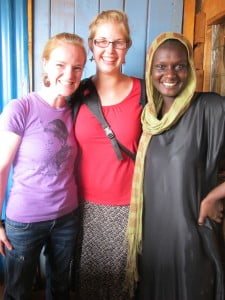On Friday, Abdul invited us over to his house to break the Ramadan fast with his friends and family at sunset. His wife, Zachia, cooked from noon to seven to prepare a feast. We sat on the floor and washed our hands, snacking on samosas and sipping home made passion fruit juice. Abdul’s friends arrived one by one, removing their shoes and joining us on the floor. Bowls of rice, beans, chicken, noodles and salad were passed and passed until we were all full to bursting. Black tea was poured and mango shared to comfort our bulging stomachs. Breaking bread with Kenyan Muslims, being invited into their ritual, was goodness and abundance. Late into the evening, Abdul and all his friends walked us through the dark Kibera dirt roads toward home.
*
 After heart breaking stories of abuse, neglect and hunger, I begged Asha for a funny story. She smirked and said, “Sports Day.” Sports Day is one day a year where the all the students and teachers walk to a field to conduct a day of silly relay races and feats of odd athleticism. One year, Asha entered the walking race, sure that her long legs would carry her to victory. She took the lead early in the walking race. But as the teacher who was the MC for the event accused her of walking like a model, she hit a rock and fell. Instead of laughing it off, she decided to pretend she fainted to save herself the embarrassment. A teacher rushed over with a first aid kit only to find her giggling on ground. The next year, Asha entered the food eating contest. She thought she would win this race as well because she considers herself a good eater. Her hands were tied behind her back, and a large plate of spaghetti and sausage was placed on a stool in front of her. A few seconds after the word GO, she realized that eating is harder than it looks. “I am a lazy chewer,” she laughed. “Plus, the food tasted so good that I wanted to enjoy it. I couldn’t believe that my classmates were ruining such a good meal by racing.” It was so refreshing to sit with her and cry tears of laughter and silliness.
After heart breaking stories of abuse, neglect and hunger, I begged Asha for a funny story. She smirked and said, “Sports Day.” Sports Day is one day a year where the all the students and teachers walk to a field to conduct a day of silly relay races and feats of odd athleticism. One year, Asha entered the walking race, sure that her long legs would carry her to victory. She took the lead early in the walking race. But as the teacher who was the MC for the event accused her of walking like a model, she hit a rock and fell. Instead of laughing it off, she decided to pretend she fainted to save herself the embarrassment. A teacher rushed over with a first aid kit only to find her giggling on ground. The next year, Asha entered the food eating contest. She thought she would win this race as well because she considers herself a good eater. Her hands were tied behind her back, and a large plate of spaghetti and sausage was placed on a stool in front of her. A few seconds after the word GO, she realized that eating is harder than it looks. “I am a lazy chewer,” she laughed. “Plus, the food tasted so good that I wanted to enjoy it. I couldn’t believe that my classmates were ruining such a good meal by racing.” It was so refreshing to sit with her and cry tears of laughter and silliness.
*